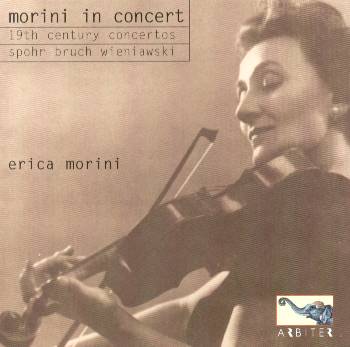This is a doubly felicitous release as it gives us
concerto performances recorded privately in the 1960s and also enlarges
Morini’s discography. She recorded the Bruch G minor with the Berlin
Radio Symphony and Fricsay but neither the Spohr nor the Wieniawski
were otherwise commercially recorded. A Sevcik student at the age of
seven, Trieste-born Morini made her debut with Nikisch at the age of
twelve and was soon taking prestigious engagements as well as embarking
on a series of recordings for Grammophon and Polydor in the 1920s. Despite
early success in America in 1930 – and renewed ones following her enforced
emigration a few years later - her career slowly petered out. The unpleasant
details of the theft of her Stradivarius and all personal papers shortly
after her death aged ninety-one in 1995 make for grim reading.
These performances with Frederic Waldman and his Musica
Aeterna Orchestra were recorded privately on acetate by a pupil of the
conductor’s. Though Morini was tagged the Word’s Greatest Woman Violinist
– a publicist’s puff if ever there was one and a self-limiting one to
boot – she was indeed an unusually refined and elegant player. She had
a small tone, lyrically deployed, with a strong albeit not invincible
(but still remarkable) technique, reliable intonation but without a
distinctive tonalist’s colouration. This could work to her advantage
in baroque and classical works but was sometimes less than ideal in
broader more obviously romanticised canvases (though she was admired
in Brahms and Tchaikovsky).
The acoustic is quite dry but acceptably so and the
acetates have come up fresh and full of detail. One immediately notices
in the first of the performances, that of the Spohr (recorded in 1963
and the earliest of the trio), that Morini’s vibrato is extremely sparing.
She makes one particularly gauche slide in the opening Allegro but otherwise
her portamenti are as sparing as her vibrato is controlled though there
are no lack of finger position changes and other intensifying devices
to wring colour and spice from the score. Problems reside in her lower
two strings which by this time – she was 62 – sound rather dry and unwarmed
and her lack of charismatic power at climaxes and before orchestral
tutti. The upper strings sound - in Morini’s terms – fine, sweet and
tight but the disparity between them and the consequent unequalized
scale is quite noticeable. The result is rather a case of two distinct
voices; tight and sweet upper and far more slow and dull sounding lower.
There is a compensatory amount of sheer elegance in the slow movement
and some elfin playing as well – mobility and technical address - and
in the finale her dancing confidence is spiced with delicious humour.
The Bruch (from 1966) opens chastely, without theatrical flourish (but
with a momentarily distracting pre-echo). Morini avoids the oratorical
and deigns to dig into the string; she’s not for making a big sound,
preferring instead clarity of passagework and forward-looking drive
without specious drama. She controls the line of the Adagio with affectionate
generosity but again the vibrato usage is idiosyncratic and in some
ways pre-Kreislerian in its abjuring of constant application. In the
finale, attractively played and phrased though it is, the lack of tonal
opulence may come as a burden for those used to more passionate and
powerful players.
The Wieniawski features a nice flautist who sparkles
in the Allegro moderato opening movement (and distracts one perhaps
from Morini’s temporary flatness). Her playing should in toto
be seen as independent of the prevailing orthodoxy or orthodoxies of
then contemporary violin playing. This is a work that one associates
most strongly with Elman, Heifetz and Stern and their individual sonorities
could not be more distinct from Morini’s way with the work. Some of
her passagework sounds scratchy (maybe not helped by the recording)
and tonally somewhat unlovely but there are piquant slides and a general
stylishness that can communicate something of her obvious appeal. Waldman
is a robust collaborator and he points the slow movement to good effect
allowing her to shape the line with affection. There is occasional lack
of colour in her playing – as in the finale – and the coolish temperament
is not what might look for in a work like this but there’s little doubting
her fine style and sense of momentum.
This is one of a number of Morini discs that Arbiter
have in their catalogue. With Allan Evans’s useful notes and some nice
accompanying details – programmes, photographs – this is a tempting
prospect. Those who want to acquaint themselves further with Erica Morini’s
very individual talent will find much to occupy them here.
Jonathan Woolf
